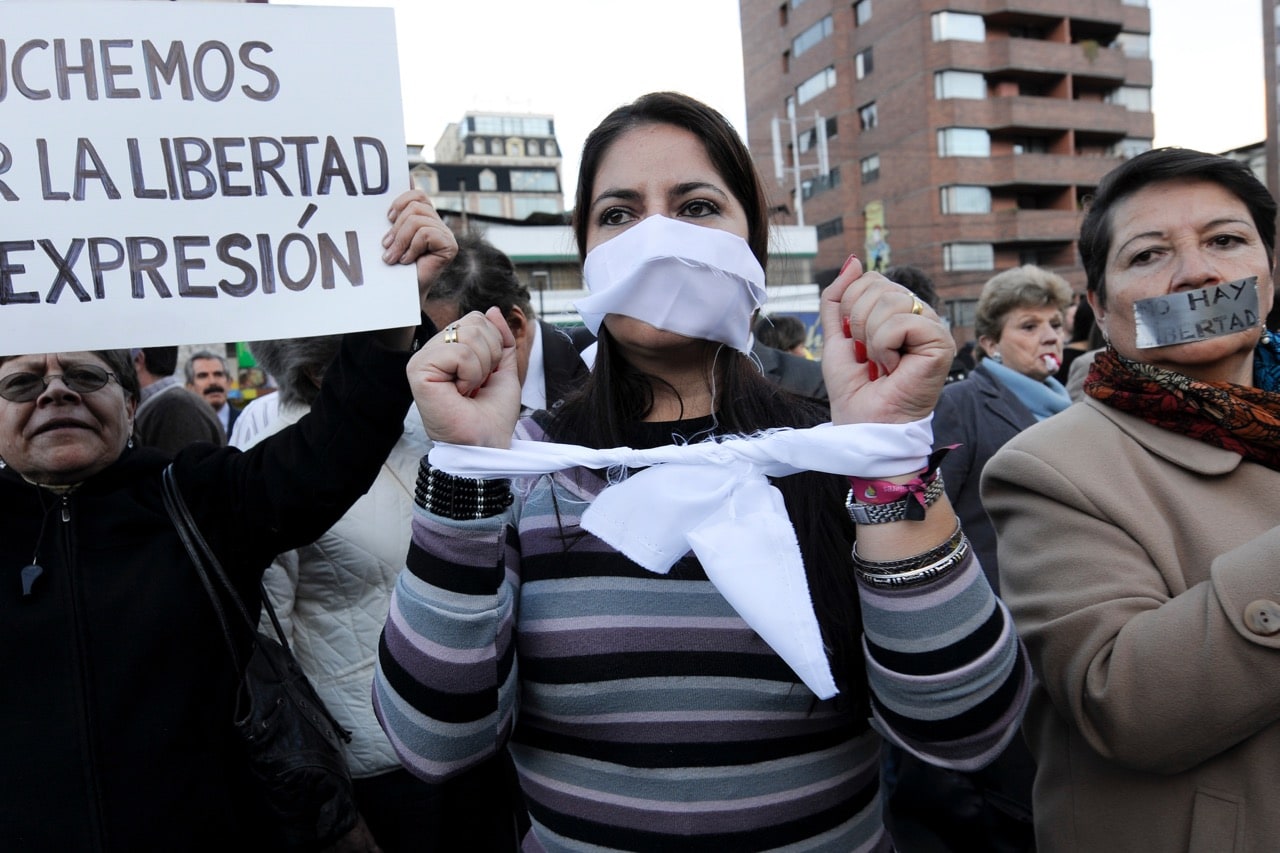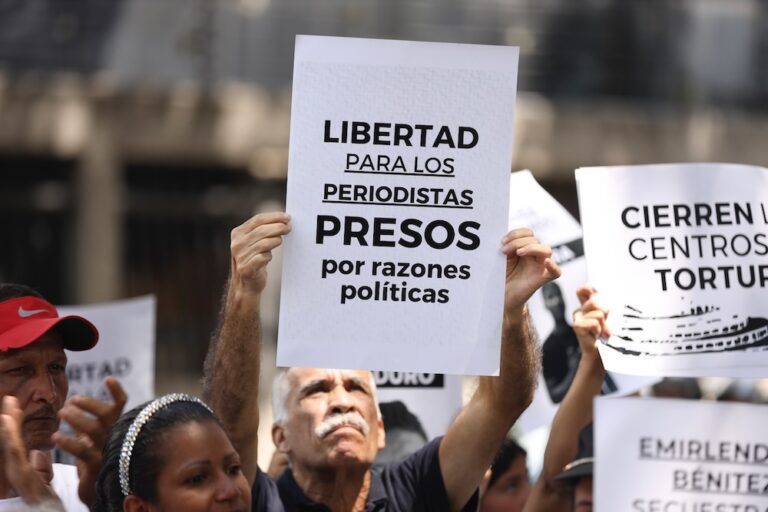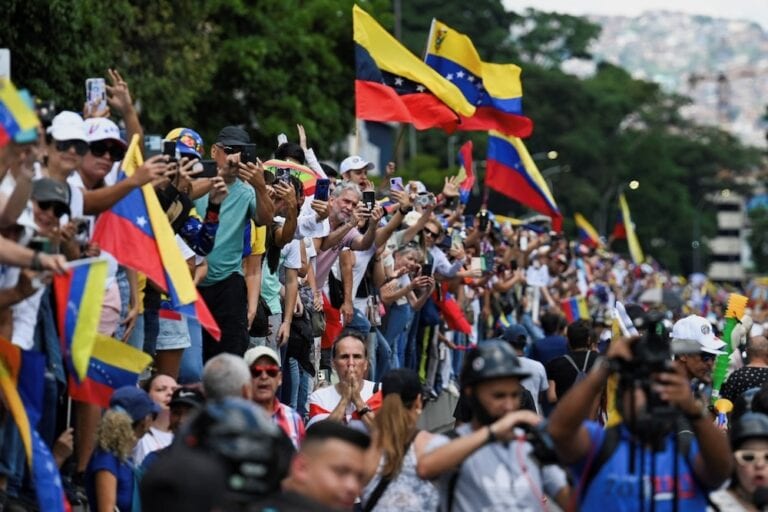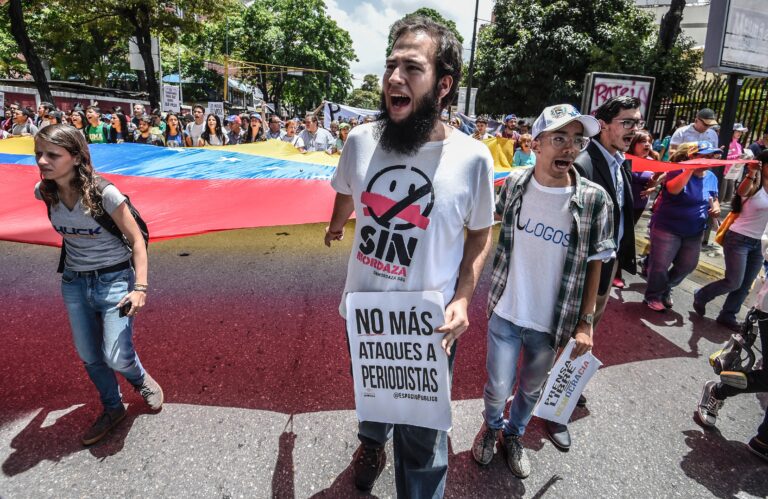Exorbitant fines, jail sentences or the closure of media outlets… These are some of the outcomes of legal instruments used against journalism in Latin America and the Caribbean today.
This is a translation of the original article.
A judgement for millions of dollars, a criminal case that could result in a jail sentence or a complaint launched with a state body that results in the closure of a media outlet or penalises it to a level that renders it unviable… These and others are some of the legal instruments that are being put to use around Latin America and the Caribbean today, creating fertile ground in the region for business owners, governments and public officials to arm themselves – without a need for bullets – against freedom of expression and those who want to freely practice journalism.
The weapon in question is not a firearm, but it achieves a similar result as it does its damage using the law. The comparison is strong, but appropriate, according to our investigations, which are supported by observations made by specialists consulted by IFEX.
The phenomenon is being studied carefully by international organisations, as well as local organisations based in a number of the countries in the region. Legal mechanisms are being employed in order to apply disproportionate measures against journalists or media outlets, resulting in a dual impact: punishing those who have been a source of irritation and intimidating the entire journalistic community.
An exploration of the issue reveals that during times of economic distress within traditional journalism, legal actions that could result in demands for economic compensation generate fear and self-censorship.
As such, IFEX-ALC, a network of organisations dedicated to defending freedom of expression in 15 Latin American and Caribbean countries, submitted an Amicus Curiae brief to the Inter-American Court of Human Rights in the case of Venezuelan lawyer and university professor Tulio Álvarez. Álvarez was sentenced to two years in prison for writing an opinion column that touched on allegations of corruption involving a government official.
In its Amicus Curiae, IFEX-ALC has highlighted the fact that the case constitutes an opportunity for the Inter-American Court to re-affirm that which it already established in its jurisprudence regarding the use of criminal law and the right to freedom of expression in democratic societies. As such, the Inter-American Court has an opportunity to once again call on States to decriminalise slander and libel offenses.
A plethora of cases
Tulio Álvarez’s case is just one among many. The region is host to a significant number of cases in which criminal law or the judicial system as a whole are used to punish journalism.
Another important case in recent years involved former Ecuadorean president Rafael Correa and journalist Fernando Villavicencio. The case against the journalist originally centred on accusations of computer hacking and defamation, but then was followed by issues around insolvency as there was an attempt to force payment of the USD$47,000 that the Ecuadorean justice system sentenced Villavicencio to pay to Correa. The monetary sum, however, was not the only penalty as Villavicencio was also sentenced to 18 months in prison.
In its annual reports, the Office of the Special Rapporteur for Freedom of Expression of the Organisation of American States (OAS) documents cases of media outlets and journalists who have faced criminal charges. In 2017, five percent of the reported cases fell under this topic.
The 2018 report has not yet been published, but the Office of the Special Rapporteur had already documented more than 60 cases linked to use of judicial systems against freedom of expression in the 16 countries of the Americas. Eighteen of the 60 cases took place in Venezuela.
Of the cases in Venezuela, one of the most talked about has been that of Armando.info. A number of journalists from the media outlet were accused of defamation based on a journalistic investigation they had conducted. The journalists fled the country as a result of the actions against them.
Caribbean countries are also on the list of those carrying out these types of actions. In Dominica, the justice system ruled in favour of a government official who accused a radio talk show of defamation, sentencing the media outlet to pay a large sum of money. Cases were also documented in Suriname and Trinidad and Tobago.
Although 2019 has just begun, there are already indications of more of the same to come. Early in January, Raúl Peñaranda, the editor of the Brújula Digital information portal in Bolivia, reported that he was being subjected to government “intimidation” after a decision by the state media outlet Entel to initiate legal actions against him based on a journalistic investigation.
Partial improvements
According to Edison Lanza, the OAS’s special rapporteur for freedom of expression, there have been some positive developments: “There is a group of countries that have repealed or made modifications [to the law] regarding the offences of defamation, libel and slander in favour of the public interest.”
Uruguay, Mexico at the federal level, Argentina, Jamaica and other countries in the Caribbean are among those demonstrating positive developments. Twelve countries in total have made these kinds of changes. There are, however, still more than a dozen countries with criminal legislation on the books for these types of offences.
Lanza noted that, “there are others that still retain defamation as a criminal offence, and they clearly use it. This is the case for authoritarian governments with officials who do not want to be questioned or do not want to fall under inspection in any way. They use it to criminalise journalistic investigations. This becomes a more acute mechanism for persecution.”
The rapporteur noted that Venezuela represents a “paradigmatic” case where there have been a number of occurrences over the last few years. Lanza also noted the situation in Peru, where journalists who have investigated corruption stories have been faced with criminal proceedings. In the same way, Lanza commented that the Correa government also brought forward several cases of the same type in Ecuador.
Lanza added, however, that countries such as Nicaragua, Honduras and Venezuela have also resorted to other criminal accusations that are not among those typically used against journalism, such as “terrorism”, “subversion” and other types of “contempt”. These types of measures have also been applied in Brazil.
Lanza also stressed the importance of studying the Tulio Álvarez case in Venezuela and understanding these sorts of measures as a central issue in the region. Ultimately, it is about paying attention to such cases in order to eliminate or at least restrict the use of criminal law to limit freedom of expression: “It is emblematic for the victim, but also because the Court has not resolved a case linked to criminal law regarding the dissemination of information of interest to the public in many years.”
“A toxic recipe”
Lawyer and director of litigation for the Robert F. Kennedy Centre Angelita Baeyens also highlighted the importance of the Tulio Álvarez case and agreed with Lanza in saying that it represents one more in an important series of cases that make up a “model of intimidation” used against journalism and the free press.
She noted that in the Americas “we are on the right track” as several countries have eliminated legislation on typical criminal charges against journalists, such as contempt and defamation.
For Baeyens, however, “there is a clear negative and growing tendency in the application of other types of criminal accusations. In countries with an authoritarian context, such as Nicaragua, we are seeing the use of very broad and ambiguous criminal accusations, such as those relating to terrorism or attacks on national security. These measures generate panic, and we are seeing an increase in their use.”
“All types of information are used to lay charges against journalists, so it is very difficult to launch a defence. And since they are serious crimes they also stipulate the detention of the person. This differs from cases of contempt or defamation, in which the freedom of the person is not compromised during the proceedings. With the more serious charges there are implications that are not obvious at first glance and they are extremely problematic for the journalist, even if the proceedings do not result in a conviction,” Baeyens added.
Leaving the criminal sphere and considering the civil and administrative environment, Baeyens commented on the manner in which other regulations and laws are used as a form of harassment and punishment, “resulting in an intimidation effect that carries forward and translates into a general environment of self-censorship among journalists.”
It is not just about “fines, million-dollar lawsuits and sanctions. The tax system and other forms of administrative harassment via regulations are also used.” According to Baeyens, the litigants look for faults in order to punish journalists and organisations that are under the scrutiny of certain Latin American governments. Baeyens pointed out the use of “legal or administrative mechanisms that appear neutral but where there is a clear intention to punish or intimidate a journalist for his or her work.”
“It is a toxic recipe. We don’t just have a judicial system that fails to apply the legal regime with independence and adequate guarantees, but additionally it is a legal regime that can be interpreted in a capricious manner. This constitutes a menu of offences from which they can choose in order to pursue and silence individuals, primarily journalists,” Baeyens said.
An example of this use of the law is the case of Mexican journalists Claudia García Fragoso and Teresa Cárdenas.
Fragoso and Cárdenas were accused of “vote buying” while covering the 2015 elections. According to press releases and civil society organisation reports, the two journalists were arrested and assaulted after filming the violent detention of individuals who, in turn, had been accused of electoral crimes. The case illustrates the application of criminal accusations that theoretically are completely disconnected from journalism.
Within this context, the Inter-American Court’s decision in the Tulio Álvarez case could represent a fundamental element in the fight to eliminate these types of legal instruments that in a cunning way muzzle, threaten and curtail freedom of expression.



